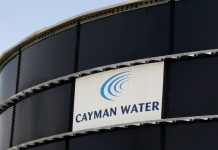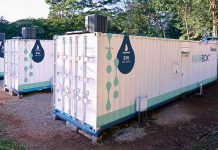Marc Gunther
How’s GE’s ecomagination going?
I put that question today to Mark Vachon, who is vice president for ecomagination at General Electric (GE). He replied by talking about natural gas.
“The large macro trend of gas is massive,” he said. “Our oil and gas business will be a huge beneficiary.”
An abundance of shale gas in the U.S., and methane gas reserves in Australia present a wealth of opportunities for GE, which plays all along the supply chain for natural gas.
“We’re a massive player in gas exploration,” Mark said. “We have a water business that can deal with issues in the fracking process.” And, of course, GE sells lots of gas-burning turbines, including a new combined cycle power plant, currently available in Europe, that enables gas to be burned more efficiently and in concert with renewable energy. (See my June blogpost, GE’s big bet on natural gas)
But can you put “ecomagination and shale gas in the same sentence? Yes,” Mark said. GE will focus on making shale gas cleaner, “with technologies like zero-leak valves” and water filtration products like a mobile evaporator that is basically a truck (see below) “designed to enable on-site frac water recycling, reducing the volume of wastewater and fresh water that needs to be hauled to and from the project site.”
 Like it or not, natural gas is the big story today in the energy business. This is good for GE. It’s probably good for the U.S., given our domestic supply. Whether it’s good thing for the climate is very much an open question. If cleaner-burning gas plants replaces dirty coal plants, they will bring meaningful but incremental progress towards a climate solution. If cheap, abundant natural gas stalls the development of low-carbon renewable energy, or discourages investment in new clean-energy businesses, that’s a problem. Chances are, it’ll do both.
Like it or not, natural gas is the big story today in the energy business. This is good for GE. It’s probably good for the U.S., given our domestic supply. Whether it’s good thing for the climate is very much an open question. If cleaner-burning gas plants replaces dirty coal plants, they will bring meaningful but incremental progress towards a climate solution. If cheap, abundant natural gas stalls the development of low-carbon renewable energy, or discourages investment in new clean-energy businesses, that’s a problem. Chances are, it’ll do both.
I met Mark near the U.S. Capitol, where he was headed for meetings on energy security with House leader John Boehner, among others. He has overseen GE’s ecomagination portfolio for Jeff Immelt since last October. Ecomagination products include efficient aircraft engines and locomotives, appliances, and LED and CFL light bulbs as well as GE’s gas, nuclear, renewable energy and smart-grid businesses; they’ll generate $20 billion to $22 billion in revenues this year, Mark estimates. The 52-year-old exec, who has been with GE for 28 years, was previously President & CEO of GE Healthcare’s $9 billion Americas Region. He still lives in Milwaukee, where the healthcare business is based, but because one of his jobs is to make ecomagination more global, he has traveled this year to Abu Dhabi, Dubai, Israel, Europe, Australia and China, and he’s soon headed to Brazil.
So if the gas business is booming, where are the challenges in the ecomagination portfolio?
Nuclear’s an obvious one. The son of a nuclear engineer, Mark believes in the technology but says, post-Fukushima, that “it’s very clear, at least for the moment, that we’re in a hiatus.” But, he added, “the nuclear industry is very good at learning from its mistakes.”
Wind, too, faces short-term issues, he said: “It’s clearly challenged over the next couple of years.” Without clean-energy mandates or tax subsidies, wind struggles to compete with cheap natural gas. And there’s uncertainty about those subsidies, particularly in the U.S. where Congress is looking to manage budget deficits.
This past spring, GE made a major commitment to solar PV, drawing on technology developed at the National Renewable Energy Lab. Mark said the company will site a manufacturing plant in the U.S. to make the panels.
Does GE remain committed to ecomagination despite the gloomy policy environment in the U.S.? After all, Immelt put his reputation on the line by becoming a vocal advocate for climate regulations through the U.S. Climate Action Partnership. That didn’t end well.
“Business has to step up and act,” Mark said, nothing that GE plans to buy 25,000 electric cars for its own fleet.
“We are not going to wait for policy,” he added. Good thing.
DISCLOSURE: None.
Marc Gunther is a contributing editor at FORTUNE magazine, a senior writer at Greenbiz.com and a blogger at www.marcgunther.com.









Gas is one from the top selling products in the small country Belgium .
Al people need to focus on green energy.
Hope we al are trying the best to helping the world.